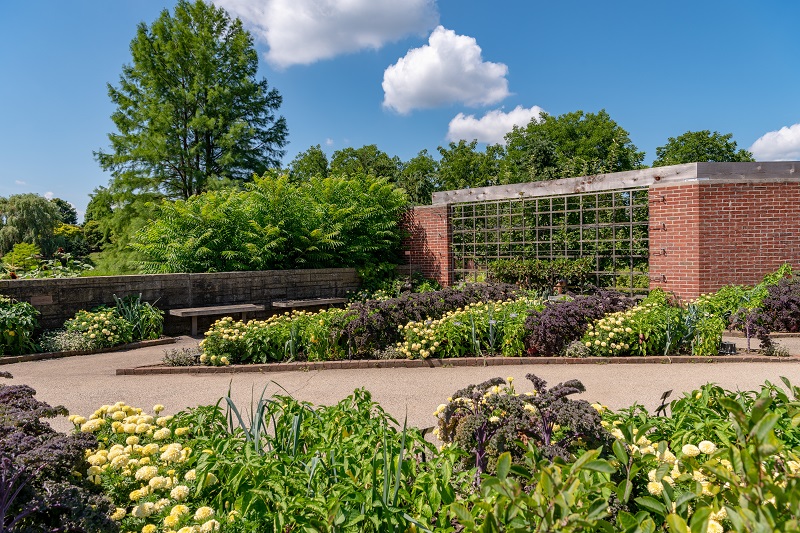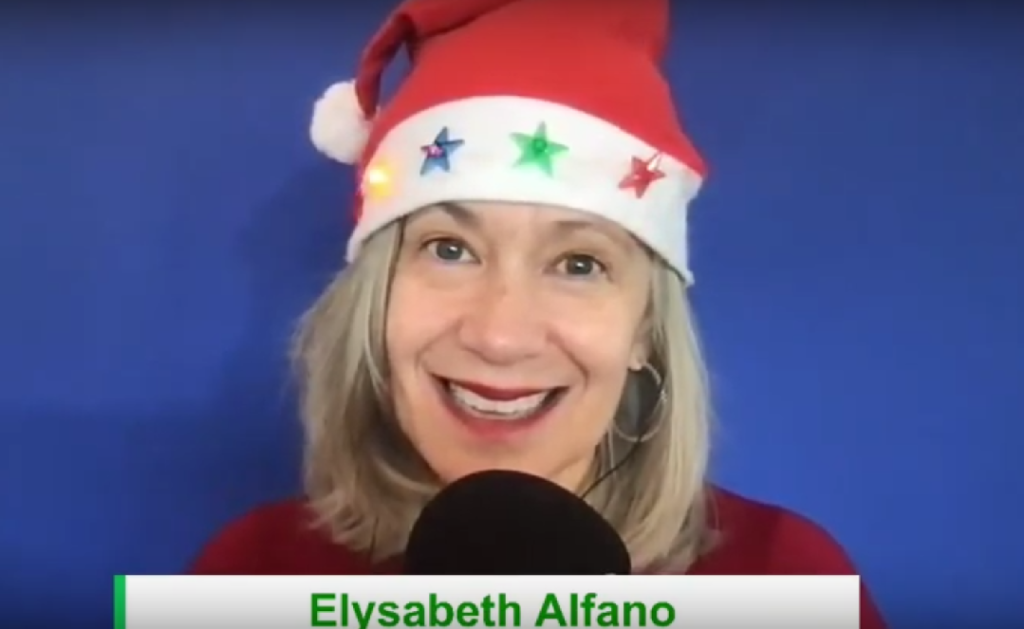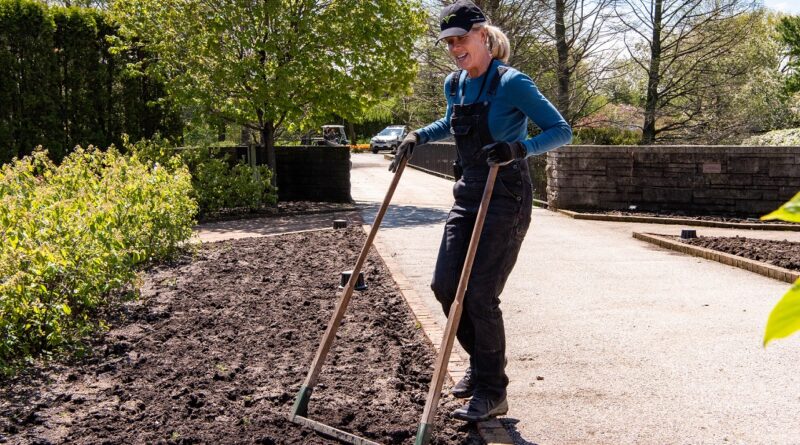“We’re Gardening for the Public.”
Podcast: Play in new window | Download (Duration: 1:59:52 — 108.7MB)
Subscribe: Apple Podcasts | Spotify | Android | iHeartRadio | Podchaser | Email | TuneIn | RSS | More
(February 28, 2021) At this time of year, a lot of folks start planning their gardens. But what if you’re responsible for growing 45 to 50 thousand plants organically? If you’re horticulturist Lisa Hilgenberg from the Chicago Botanic Garden, that means managing the four-acre Regenstein Fruit & Vegetable Garden. It means working with a crew of four and 25 volunteers. It means mentoring interns from Windy City Harvest, College First (Chicago Public Schools) and the French Heritage Society. And it means that when you say, “We’re gardening for the public,” especially during worldwide pandemic, you have a tough job.
But, like many people, Hilgenberg has adapted. She has regularly appeared on our show over the past several years. When she last visited us, COVID-19 was new and it was scary. Public institutions like CBG were just beginning to figure out the impact it would have on their operations. What it meant for the fruit and vegetable garden in April of 2020 was that spring planting did not happen. But, as you’ll see, they caught up.
(I talked to Lisa Hilgenberg about the past eleven months. Here’s a partial transcript of our conversation. She told me that without volunteers, the workload was challenging.)
LISA: Last year, I had to overhead water a couple of times, where I had to just turn on the irrigation, because I couldn’t get to all of the hand watering of all the vegetables. I’ve got about fifty-six hundred square feet of vegetable growing area. That’s huge!
MIKE: It is. And did you use to have your volunteers help you with that?

LISA: Rarely did we have volunteers help with that. Because we had to focus on all of the tasks, for the most part, without volunteers, we spent whole days watering. Probably two whole days during the week are spent watering. And that means that someone mans the irrigation system that takes care of the turf and the landscaped part of the four-acre island. And then the vegetable beds are completely separate. But we’ve always in the past watered those with a hose or by hand because it’s much better for vegetable plants. So, we had to just turn on the irrigation and let it rip this [past] summer, just to make sure that things were staying alive.
MIKE: And it’s because you had other duties to perform.
LISA: Exactly.
(Hilgenberg told me that despite the slow start, the garden met its quota for production. Those fruits and vegetables are taken to the Farm on Ogden. That’s where Windy City Harvest works with Lawndale Christian Health Center to bring food, health, and jobs to people in the neighborhood. I told her about what we learned on the show–that many small farms had a very good 2020.)
LISA: I think it’s about intentionality. And it’s about a clear calendar. And it really caused us to focus on what needed to be done out in the garden. Nobody wanted to be in the office. There were no classes, no events. Things were cleared off our calendars. And so we were all focused on…the good pieces of this. Gardening was that good piece for so many people. I mean, it was a record year in the nursery industry for sure, in the garden center world. In all sort of factions of horticulture, I think it was a really good year. Not to mention, just a great growing year. I mean, what a gorgeous fall; it was very productive.
MIKE: So this year, the idea is you’re going to start it out the way your normally do [except] with fewer people helping. What’s changed in 2021, based on what you learned in 2020?
LISA: It’s the usual “wow” factor going into spring. We’re very much excited about planting a full slate of spring crops. We’ll plant everything from A to Z.
MIKE: In 2021 there will be visitors, though they will be masked and social distanced. Now we have a better idea of how that works.
LISA: We were talking about this today. We had a meeting and it was really focused on just how much and how important the public is to our work. We’re gardening for the public. And we’re gardening to inspire and teach people. We missed that last year, and the volunteers are included in that.
By the way, the Chicago Botanic Garden has more online classes than you can shake a garden fork at. They’re all reasonably priced and happening right now. For instance:
…hands-on gardening, container gardening classes, vegetable gardening courses, backyard chicken raising classes, pruning workshops, shade gardening classes, perennial gardening courses, composting workshops, lawn care classes, bonsai classes, beekeeping classes, edible plants classes, herb gardening classes, organic gardening classes, orchids workshops, and houseplant workshops.
There are daytime classes, evening classes, and weekend classes. Lisa Hilgenberg will be teaching “The Organic Vegetable Garden in Spring” on Saturday, April 3.
The return of “The Plant-based Boss”

Our final show of 2020 featured the woman I now suspect we will be referring to as “The Plant-based Boss.” Her name is Elysabeth Alfano and if you want to know the story behind her title, I suggest you watch the video. Not only will you get to see Elysabeth wear her holiday hat (right), but you can watch the 2020 version of our own Xmas classic, “It’s a Wonderful Slice of It’s a Wonderful Life.” That alone is worth the price of admission. But I digress.
Alfano is an award-winning media personality, successful businesswoman, investor and one of the foremost plant-based business experts in North America. She is the founder of media and marketing company Plant Powered Communications. Elysabeth produces and hosts the weekly online series The Plantbased Business Hour (PBH), and also hosts both the Awesome Vegans Influencer Series and her weekly syndicated Smart Talk Radio Network show Plantbased Life & Style, at 3pm CT each Sunday on WCGO radio (which rings a bell, though I can’t exactly place the call letters).
When she dropped by at the end of the year, she gave us a sneak preview of which plant-based trends were going to be making headlines in 2020. Now she alerts us to a 60 Minutes video featuring Bill Gates and his interest in plant-based meat options, including one that relies on fungi, produced by the Chicago company Nature’s Fynd. As they note in the clip, Gates has already invested in companies like Impossible Foods and Beyond Meat. Alfano talks about this on her Plantbased Business Minute on Linkedin.
BTW, if you want to see a bunch of rightwing heads exploding on the Intertubes, just type “Bill Gates meat” or “Bill Gates on meat” into a search engine. It ain’t pretty. However, if you want to lose some sleep, check out this story about Gates’s involvement with “synthetic biology.”
Getting back to Nature’s Fynd, its story is fascinating.
Nature’s Fynd (formerly known as Sustainable Bioproducts LLC and focused on biofuel) is a company that develops microbe-based proteins for meat substitutes. Founded in 2012, and based in Chicago, the company has been funded by a series of federal agencies in the United States (National Science Foundation, Department of Agriculture, Environmental Protection Agency and National Aeronautics and Space Administration) since 2013 and began taking venture capital financing backed by the likes of Bill Gates, Jeff Bezos, Michael Bloomberg, Al Gore and Richard Branson in 2019. As of 2020, the company aims to serve a range of consumer and industrial applications with its protein production platform, including microbial manufacturing needs as well as other space travel uses for NASA. Its protein products are fungus-based rather than plant- or animal-based.
Another Chicago company that is on Alfano’s radar is Ingredion.
Ingredion is a leading global ingredients solutions company. We make sweeteners, starches, nutrition ingredients and biomaterials that are used by customers in everyday products from foods and beverages to paper and pharmaceuticals.
We turn corn, tapioca, potatoes, strawberries and other crops into ingredients that make crackers crunchy, candy sweet, yogurt creamy, lotions and creams silky, plastics biodegradable and tissues softer and stronger. And our innovative ingredient solutions help customers stay on trend with simple ingredients and gluten-free or high-fiber foods that appeal to today’s consumers.
The world beyond meat–to coin a phrase–is a mix of science, innovation and chutzpah. Strap in. Things are starting to get interesting.


